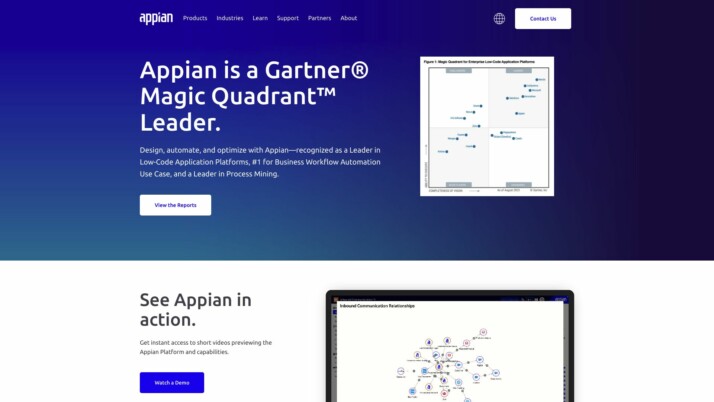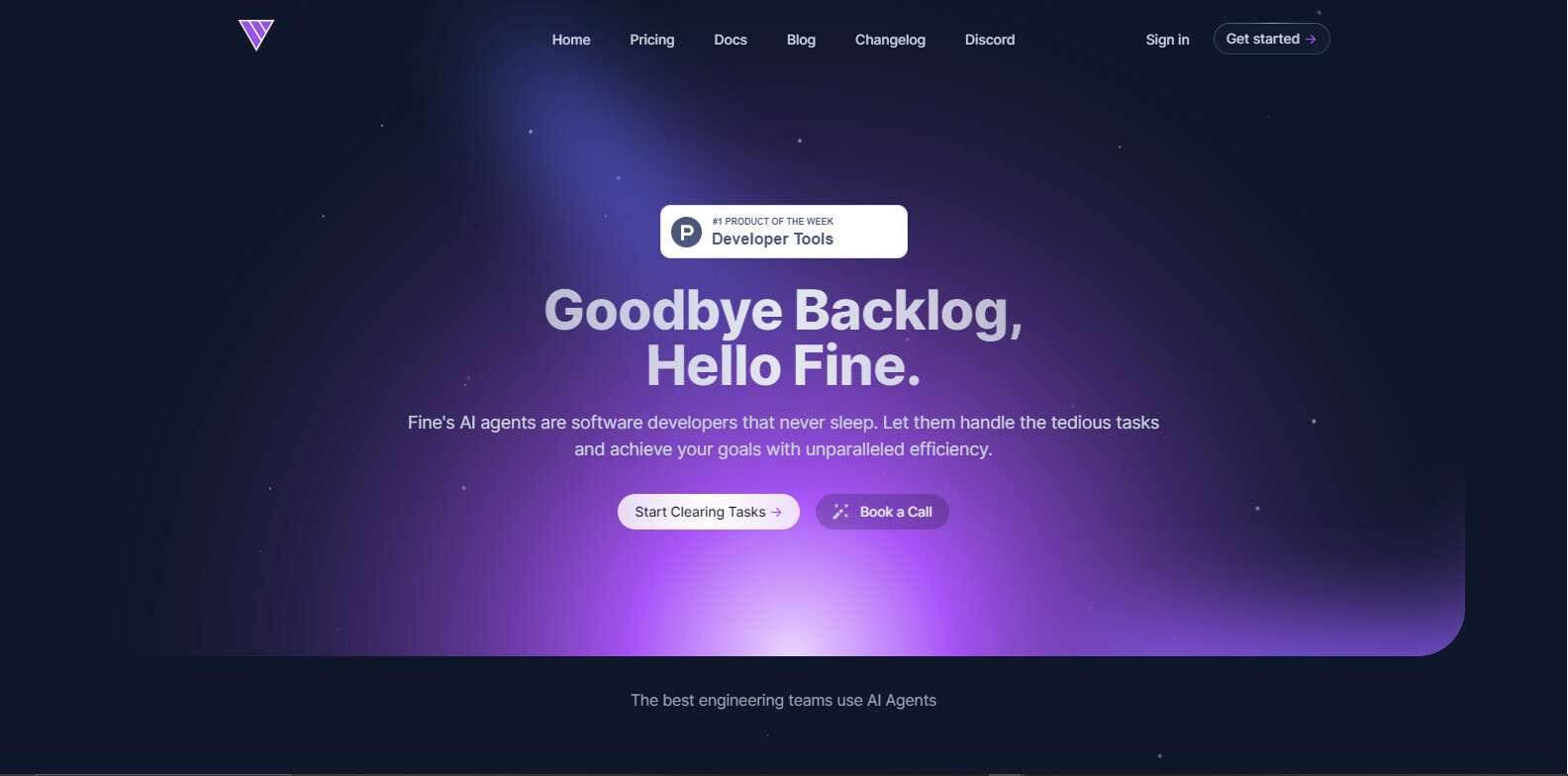Appian vs. Fine AI: Comparing AI-Powered Development Solutions
AI-powered tools revolutionize software development and business automation, offering solutions to streamline workflows and boost productivity. This comparison examines Appian vs. Fine AI, and SmythOS, three platforms at the forefront of AI integration. Appian’s low-code approach empowers businesses to infuse AI into their processes, while Fine AI specializes in AI agents for coding tasks.
SmythOS emerges as a versatile contender, combining powerful AI agent creation with extensive deployment options. We’ll explore each platform’s unique features, strengths, and limitations to help you choose the best AI solution for your needs, whether you’re a developer seeking to automate coding tasks, a business leader looking to enhance operations, or an AI enthusiast exploring cutting-edge technologies.
Appian Overview
Appian empowers businesses to integrate AI capabilities into their workflows through a low-code platform. The software combines powerful automation tools with built-in AI features, enabling organizations to streamline processes and enhance decision-making.


Appian’s AI Skill Designer allows users to create custom AI models without extensive data science expertise. This democratization of AI development opens up possibilities for businesses across various industries to leverage machine learning in their operations. The platform offers pre-built AI capabilities for document classification, data extraction, and email routing, accelerating the implementation of intelligent automation.
Appian’s AI Skill Designer allows users to create custom AI models without extensive data science expertise. This democratization of AI development opens up possibilities for businesses across various industries…
Security and privacy take center stage in Appian’s approach. The platform ensures that AI models and data remain under the user’s control, addressing critical concerns for businesses handling sensitive information. Integration with advanced AI services like OpenAI enhances natural language processing capabilities, enabling more sophisticated interactions in areas such as automated communication and document management.
Appian’s Enterprise Copilot feature showcases the platform’s focus on practical AI applications. By allowing users to create knowledge sets from curated documents, it facilitates rapid information retrieval and decision support. This approach to AI implementation aligns with Appian’s vision of enhancing human work by automating routine tasks, freeing up employees to focus on higher-value activities.
While Appian offers robust AI integration and low-code development options, it may not provide the same level of specialized AI agent creation and management as dedicated AI agent platforms. Users seeking highly autonomous AI agents or advanced multi-agent collaboration might find Appian’s offerings more geared towards process automation with AI augmentation rather than standalone AI agent development.
Fine AI Overview
Fine AI empowers developers to create customized AI agents that automate software development tasks. The platform specializes in generating code, managing APIs, and executing migrations, streamlining the development process for engineers.


Fine AI’s agent builder allows teams to craft specialized agents for backend, frontend, and testing purposes. These agents interpret specifications and implement coherent changes across codebases. The platform facilitates collaboration by enabling teams to share and reuse agents, fostering a more efficient development ecosystem.
Fine AI’s agent builder allows teams to craft specialized agents for backend, frontend, and testing purposes. These agents interpret specifications and implement coherent changes across codebases.
A standout feature of Fine AI is its interactive previews, which allow developers to visually test code changes in real-time. This capability enhances the feedback loop and reduces the time spent on debugging and refining code.
Fine AI aims to transform the developer workflow by automating repetitive tasks, allowing engineers to focus on complex problem-solving. While the platform shows promise in boosting productivity, it may require a learning curve for teams to fully leverage its capabilities and integrate it into existing workflows.
Feature Comparison
Appian and Fine AI offer distinct approaches to AI integration and development, with notable differences in their core components and security features. Appian provides a low-code platform for building AI-enhanced business applications, while Fine AI focuses on creating specialized AI agents for software development tasks.
Appian’s strength lies in its comprehensive business process automation capabilities integrated with AI. It offers built-in AI features for document classification, data extraction, and email routing. Appian ensures data privacy by keeping AI models and data under user control. However, Appian lacks some advanced AI agent features like autonomous multi-agent collaboration and deployment options such as chatbots or scheduled agents.
Fine AI, in contrast, excels in creating customized AI agents for coding tasks. It allows developers to build specialized agents for backend, frontend, and testing purposes. Fine AI’s interactive previews enable real-time testing of code changes, enhancing the development workflow. However, Fine AI may not offer the same level of enterprise-grade security features and scalability as Appian.
Both platforms have gaps in certain areas. Neither Appian nor Fine AI explicitly mention features like constrained alignment for ethical AI behavior, integration with foundation models, or support for multimodal AI interactions. These limitations could impact users seeking more advanced or specialized AI capabilities.
Feature Comparison Table
| Appian | Fine AI | SmythOS | |
|---|---|---|---|
| CORE FEATURES | |||
| Hosted Agents (Dev, Production) | ❌ | ❌ | ✅ |
| Environments (Dev, Production) | ✅ | ❌ | ✅ |
| Visual Builder | ✅ | ❌ | ✅ |
| No-Code Options | ✅ | ❌ | ✅ |
| Autonomous Agents | ❌ | ✅ | ✅ |
| Explainability & Transparency | ✅ | ❌ | ✅ |
| Debug Tools | ✅ | ❌ | ✅ |
| Multimodal | ✅ | ❌ | ✅ |
| Multi-Agent Collaboration | ❌ | ❌ | ✅ |
| Audit Logs for Analytics | ✅ | ❌ | ✅ |
| Agent Work Scheduler | ❌ | ✅ | ✅ |
| SECURITY | |||
| Constrained Alignment | ✅ | ❌ | ✅ |
| Data Encryption | ✅ | ❌ | ✅ |
| OAuth | ✅ | ❌ | ✅ |
| IP Control | ✅ | ❌ | ✅ |
| COMPONENTS | |||
| Foundation AIs | ❌ | ❌ | ✅ |
| Huggingface AIs | ❌ | ❌ | ✅ |
| Zapier APIs | ❌ | ❌ | ✅ |
| All other APIs, RPA | ✅ | ❌ | ✅ |
| Classifiers | ✅ | ❌ | ✅ |
| Logic | ✅ | ❌ | ✅ |
| Data Lakes | ✅ | ❌ | ✅ |
| DEPLOYMENT OPTIONS (EMBODIMENTS) | |||
| Deploy as API | ✅ | ❌ | ✅ |
| Deploy as Webhook | ✅ | ❌ | ✅ |
| Staging Domains | ✅ | ❌ | ✅ |
| Production Domains | ✅ | ❌ | ✅ |
| API Authentication (OAuth + Key) | ✅ | ❌ | ✅ |
| Deploy as Site Chat | ❌ | ❌ | ✅ |
| Deploy as Scheduled Agent | ❌ | ❌ | ✅ |
| Deploy as GPT | ❌ | ❌ | ✅ |
| Scalability | ✅ | ❌ | ✅ |
| DATA LAKE SUPPORT | |||
| Hosted Vector Database | ❌ | ❌ | ✅ |
| Sitemap Crawler | ❌ | ❌ | ✅ |
| YouTube Transcript Crawler | ❌ | ❌ | ✅ |
| URL Crawler | ❌ | ❌ | ✅ |
| PDF Support | ✅ | ❌ | ✅ |
| Word File Support | ✅ | ❌ | ✅ |
| TXT File Support | ✅ | ❌ | ✅ |
Best Alternative to Appian and Fine AI
SmythOS stands out as the superior alternative to Appian and Fine AI, offering a comprehensive AI automation platform that combines ease of use with unlimited potential. Our drag-and-drop interface empowers users to create sophisticated AI workflows without extensive coding knowledge, democratizing AI development across various skill levels.
Unlike Appian’s focus on business process automation or Fine AI’s emphasis on software development tasks, SmythOS provides a versatile foundation for building and deploying AI agents across multiple domains. We offer pre-built API integrations and templates, significantly reducing setup time and allowing users to focus on innovation rather than technical implementation.
SmythOS excels in multi-agent orchestration… This capability enables teams of AI agents to collaborate on complex tasks, enhancing efficiency and scalability.
SmythOS excels in multi-agent orchestration, a feature absent in both Appian and Fine AI. This capability enables teams of AI agents to collaborate on complex tasks, enhancing efficiency and scalability. Our platform also supports a wide range of deployment options, including APIs, chatbots, and scheduled agents, providing flexibility that surpasses our competitors.
Where Appian and Fine AI fall short in advanced AI features, SmythOS shines. We integrate seamlessly with foundation models from various providers and support multimodal interactions, allowing users to create AI solutions that can handle diverse data types. Our robust security features, including data encryption and OAuth support, ensure that your AI implementations remain secure and compliant.
By choosing SmythOS, you’re not just selecting a tool; you’re embracing a platform that continuously evolves to meet the demands of AI innovation. We offer unparalleled scalability, extensive integration capabilities, and a commitment to user-friendly design that makes advanced AI accessible to all. With SmythOS, you’ll be equipped to tackle any AI challenge, from simple automation tasks to complex, enterprise-level AI solutions.
Conclusion
Appian and Fine AI offer unique approaches to AI integration in software development, each with its strengths and limitations. Appian excels in low-code AI integration for business process automation, while Fine AI specializes in AI-driven code generation and development tasks. Both platforms demonstrate the potential of AI to streamline workflows and boost productivity in their respective domains.
However, SmythOS emerges as the superior choice, offering unparalleled versatility and power in AI agent creation and deployment. Our platform’s drag-and-drop interface, extensive integration ecosystem, and support for multiple AI models make it accessible to users across various technical backgrounds. SmythOS’s ability to deploy agents anywhere—from APIs to chatbots to scheduled tasks—provides unmatched flexibility for businesses seeking to harness AI’s full potential.
SmythOS stands out with its focus on multi-agent collaboration, advanced security features, and scalability. These capabilities address the limitations found in both Appian and Fine AI, making SmythOS the ideal solution for businesses looking to fully leverage AI across their operations. Explore our diverse range of AI-powered agent templates to jumpstart your AI journey and see how SmythOS can transform your workflow.
Ready to experience the future of AI automation? Create a free SmythOS account today and start building powerful AI agents with no time limit. Discover how SmythOS can revolutionize your business processes and drive innovation at unprecedented levels.
Last updated:
Disclaimer: The information presented in this article is for general informational purposes only and is provided as is. While we strive to keep the content up-to-date and accurate, we make no representations or warranties of any kind, express or implied, about the completeness, accuracy, reliability, suitability, or availability of the information contained in this article.
Any reliance you place on such information is strictly at your own risk. We reserve the right to make additions, deletions, or modifications to the contents of this article at any time without prior notice.
In no event will we be liable for any loss or damage including without limitation, indirect or consequential loss or damage, or any loss or damage whatsoever arising from loss of data, profits, or any other loss not specified herein arising out of, or in connection with, the use of this article.
Despite our best efforts, this article may contain oversights, errors, or omissions. If you notice any inaccuracies or have concerns about the content, please report them through our content feedback form. Your input helps us maintain the quality and reliability of our information.
